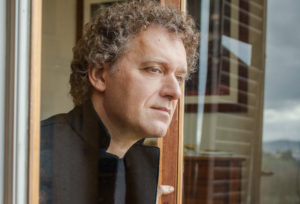Andrea Lucchesini Brings Youth to the Pergola

With only a few weeks left in his first season as artistic director, Amici della Musica’s famously groundbreaking Andrea Lucchesini reflects on the year behind him with pride.
“It was good to see that people wanted to go back to the theatre after the pandemic,” Lucchesini said, in an interview with Magenta Florence. “This was very satisfying. We had a good response from the public.”
Lucchesini has been renowned for his ways of modernizing classical orchestral performance, and the fresh, unique spin he brings to one of the oldest and most prestigious concert series in Florence. Each performance or series is a wild, imaginative creation born out of Lucchesini’s unwavering intent to stimulate the audience in new and exciting ways.
One such series is Ritratti, or “Portraits,” featuring contemporary composers who create a program, which they then play for an audience while simultaneously interacting with them, explaining what they’re playing and why. Another is Musica &, which combines music with various other art forms including ballet, mimes and poetry, and which has garnered very positive feedback.
“Music can’t be alone,” Lucchesini said. “It has to communicate with other forms of art and with life.”
His goal is to attract a more diverse audience who would not normally be drawn to classical music on its own. For instance, many people who have a passion for poetry came to the performance featuring poetry by Pier Paolo Pasolini last December, while at the same time listening to music and enjoying it. Not only has Lucchesini put music in dialogue with other art forms, but he has acquainted his audience with broader historical contexts: while listening to the 20th century poems of Pasolini, they also were exposed to the music of Bach, who is over four centuries older.
Diversifying their audience is challenging. Amici della Musica has long had their habitual, faithful concert goers who fit a certain age and demographic. However, thanks to Ritratti and Musica &, there is already a significant increase in young members of the audience, even after just one season with Lucchesini behind the wheel.
“We still have to work on this,” he said. “We’re just at the beginning. But we’re very happy to see that younger people are now going to the Amici della Musica concerts at Teatro della Pergola.”
Not only is Lucchesini attracting younger audience members, but he is spotlighting youth onstage as well, by inviting young pianists and string quartets to perform their debut concert at Teatro della Pergola, the first concert they’d ever held in Florence. He believes it’s important that a talented musician get a chance to to play at a major theatre, no matter their age.
Lucchesini wants to bring together the musician with the audience who listens. Amici della Musica has traditionally offered performances from only the most outstanding names in chamber music. But according to Lucchesini, younger members of the audience can more readily identify with younger musicians.
“Up there on the stage playing, they’re almost like gods,” Lucchesini said. “And then there’s the audience. Of course, the younger you are, the more age difference there is between you and who’s playing. So if there are young people up there playing, the young people attract younger members of the audience who can more readily identify with these musicians.”
Lucchesini plans to continue down this path, and hopes to further youth involvement during his second season as artistic director. The program is already completely finished, and one can be sure to expect nothing short of innovation and creativity from within its pages.
For now, there still remains almost a month left in Lucchesini’s debut season, and it is full of remarkable events the public won’t want to miss.
Coming up on March 12, a Musica & performance is dedicated to late composer Rebecca Clarke, a composer and the first woman to play in a symphonic orchestra. The performance will feature narration, including the reading of her actual letters, as well as acting, to bring an extraordinary woman to life just four days after International Women’s Day.
Grigory Sokolov, one of the greatest living pianists, will be playing the following Monday, March 13, in co-production with the Teatro Del Maggio.
On March 18, young French pianist Alexandre Kantorow will play a Brahms and Schubert program; on the 19th, there will be a surprise program from the Kuss Quartet.
On March 25 there is a performance by Piotr Anderszewski, one of the most important pianists on the scene today, followed by the Hagen quartet on the 26th who are equally as revolutionary.
Most profoundly, on March 27, a quartet will perform “Quartet for the End of Time,” composed by Olivier Messiaen during his time in the German concentration camp Stalag VIII-A. Based on the text of the Apocalypse from the New Testament, the performance will feature only the four instruments that were available in the camp: a piano, a cello, a violin, and a clarinet.
April 1 will feature singing, as Italian alto Sara Mingardo will appear onstage with a quartet and a pianist, interpreting Brahms and Mahler.
The final concert on April 2 is also the last of the Ritratti, featuring Italian composer Ivan Fedele. His music and music of other composers, including Schubert and Schoenberg, will be played by a syntax ensemble.
For complete information on concerts, visit the Amici della Musica website. (Vivian Stacy)
